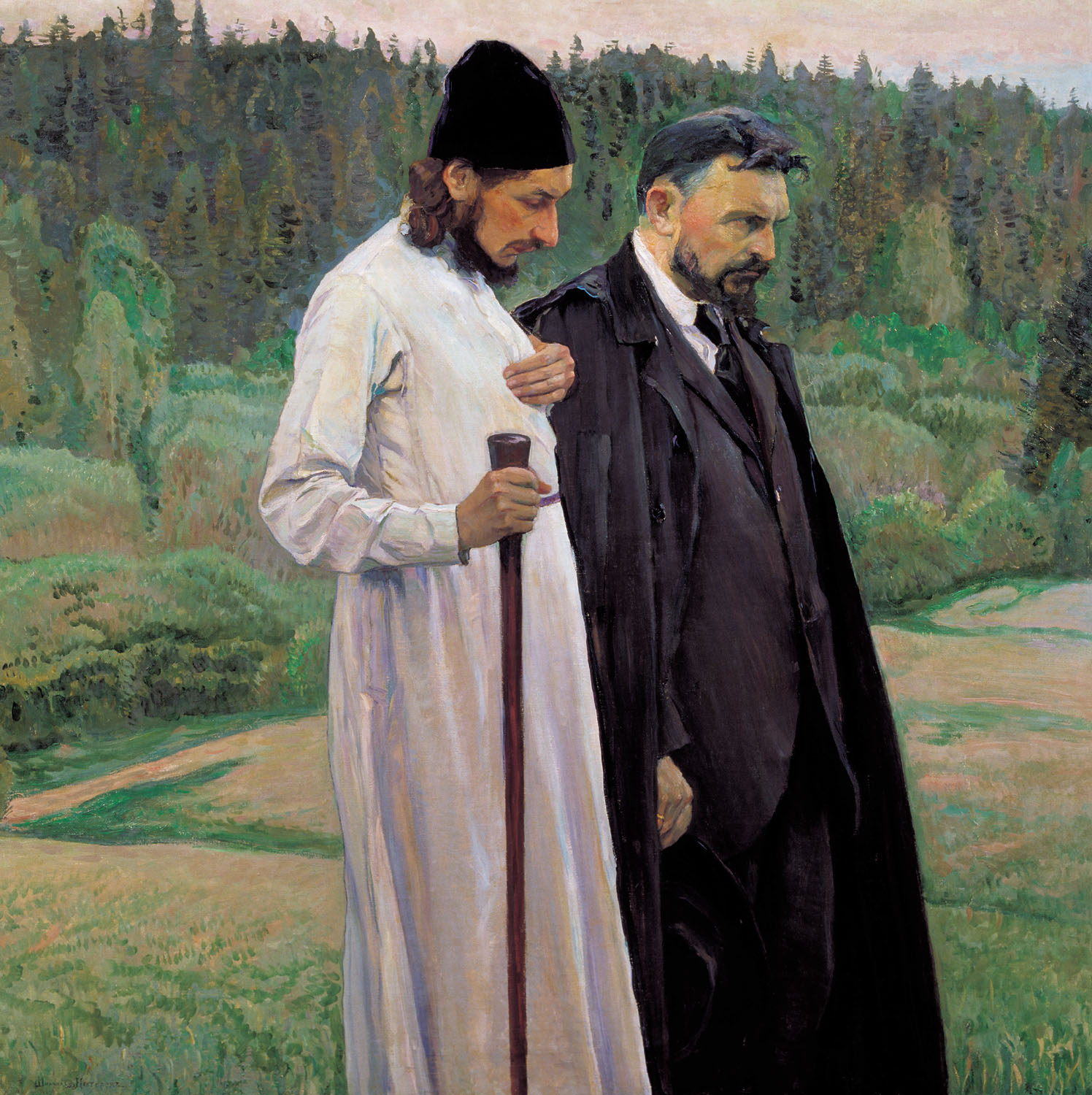"History of Russian Philosophy" is a book by N.O. Lossky. The book covers the most important Russian philosophers, including Lossky himself. Soloviev, Berdyaev, Bulgakov and Frank are prominently featured. There is a shorter chapter on Pavel Florensky. Lossky also mentions his own son, Vladimir Lossky!
While the book does mention materialist and Neo-Kantian philosophers, its main
emphasis is on thinkers who were fundamentally religious. In the West, they
would have been regarded less as philosophers and more as theologians or even
mystics. Lossky himself was a self-avowedly Christian philosopher, whose system
sounds similar to Theosophy or Anthroposophy, although he claims to have based
it on Leibniz and Biblical revelation. When Lossky mentions Bulgakov, he quotes
extensively from Bulgakov's famous description of his mystical visions.
Soloviev was another essentially Christian thinker who had visions of various
kinds. Lossky also retells anecdotes that come close to miracle stories,
emphasizes how ascetic and contrite some of the "philosophers" were,
etc.
Lossky does make some interesting observations concerning religiously inspired
Russian philosophy. Apparently, virtually all philosophers of this type are a
kind of naïve realists. They believe that man has unmediated access to an
objective, external reality. Kantian or Lockean notions of something imposing
itself between the outside world and our minds are rejected. However, Russian
religious philosophy doesn't connect naïve realism with materialism. Rather,
they argue that realism presupposes a fundamental wholeness between subject and
object. Otherwise the direct perception of an outer world would be impossible.
This wholeness is interpreted in a pantheist or panpsychist manner, and thus
opens the door to theological speculations about God. Further, mystical
intuition is seen as realist, i.e. it gives us direct and unmediated access to
a divine reality. Another important notion similar to many thinkers is
consubstantiality between matter and spirit, or between unity and multiplicity.
This consubstantiality is connected to the creedal statements about the
Trinity, which is a "consubstantial" unity-in-diversity between three
persons of the same Godhead. It's also used politically, as in the idea of
sobornost, which is supposedly a unity of free individuals, everyone
voluntarily serving the same goal ultimately derived from God. (On more
critical interpretations, sobornost is really a collectivist, absolutist
notion. Indeed, the concept is used in modern Russia by enemies of liberal
democracy.)
Lossky also points out that while many Russian philosophers accept evolution,
they emphasize cooperation rather than competition. This is true even of
materialist philosophers, such as the anarchist Kropotkin, whose most famous
work is called "Mutual aid". It's not clear where the evolutionary
notions of the more religious thinkers came from, but Theosophy would surely be
the prime suspect, although Lossky is silent on this point. Jesus is often seen
as the perfect God-man at the apex of evolution, incarnating on Earth not
simply for soteriological reasons but also for ontological ones, completing the
evolutionary process by uniting spirit and matter within one person. Here,
medieval theology have been fused with cosmic evolution.
The holistic perspective of many religious philosophers leads them to regard
all human knowledge as a unity. Lossky talks about "integral"
knowledge which somehow unites science, philosophy, theology, ethics and
aesthetics. Thus, somebody like Soloviev or Bulgakov wouldn't see any
difficulty in blending philosophy and theology.
Something not mentioned by the author is the obviously heretical character of
much "Christian" speculation in Russia. Ideas about Jesus being some
kind of primordial Heavenly Man, perhaps even a created being distinct from the
unfathomable God, sound Kabbalistic: Adam Kadmon emerges out of the Ain Soph as
its first creation. Soloviev's and Bulgakov's visions of Sophia sound like
attempts to introduce a goddess into Christianity. Lossky's own philosophy
includes Sophia. Soloviev's positive view of Catholicism would also count as
heretical in Russia, which is dominated by the Orthodox Church. Even
philosophers who were ordained priests, such as Bulgakov, often strayed from
strict Orthodox orthodoxy (pun intended).
As a sidepoint, I noticed that Lossky considers dialectical materialism to be a
contradictory jumble, and predicts that it will eventually be transformed into
a form of realist idealism. He has a point: dialectical materialism is a unique
form of materialism, since it seems to be teleological. But how on earth can a
*materialist* system be teleological? This is obviously a trait taken over from
Hegel, whose World Spirit could still be given a religious interpretation as a
pantheist god.
"History of Russian Philosophy" might be too complicated for the
absolute beginner, while still being too basic for more advanced students of
philosophy. I read it after first digesting large chunks of Frederick
Copleston's history of Russian philosophy. It did help with some background
information. Perhaps Lossky's book could serve as a kind of mini-encyclopaedia
of Russian philosophers, mostly of the religious persuasion. I found it
immensely interesting and stimulating.

No comments:
Post a Comment